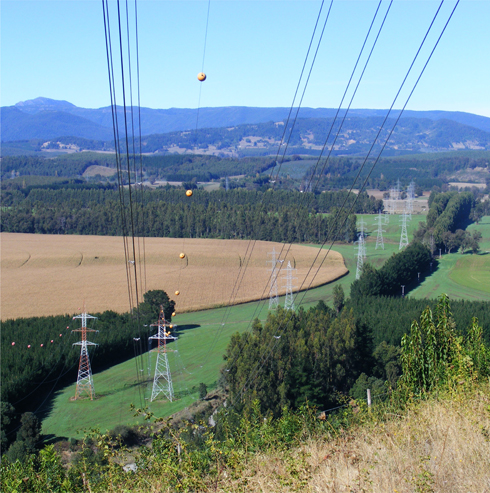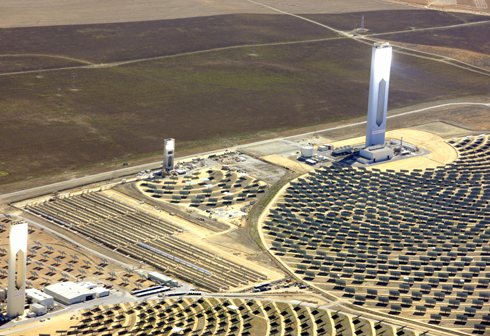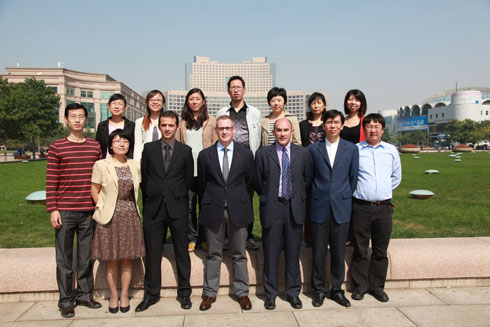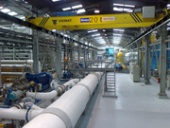 Abengoa
Abengoa
Annual Report 2011
- Activities
- Activities
- Concession-type Infrastructures
- Our Business
Transmission lines
When compared with electrical systems as a whole (generation, transmission and distribution), power transmission infrastructures account for only a small percentage of total costs, both in terms of the initial investment and subsequent operating and maintenance expenses. To provide an example, it is estimated that these infrastructures account for barely 14 % of total investment. They nevertheless remain a core element of the electricity system as a whole and promise much for the future.
There are essentially two prevailing trends worldwide:
- Countries in which private companies are not only tasked with the engineering, procurement and construction (EPC) of power transmission lines, but actually retain possession of the finished assets. This model is most commonly seen in emerging economies.
- Countries in which private companies carry out solely the EPC on the lines, with the state retaining ownership of the assets. Despite being more typical of developed economies, this approach is in fact becoming more widespread and certain investment opportunities are beginning to materialize.
As a result, we are witnessing an increasing number of opportunities in power line concessions, and companies with a dominant international presence and proven track record in managing transmission assets, such as Abengoa, are now ideally positioned to tap the huge growth potential of this market.
Abengoa manages power transmission assets in Latin America in an efficient, effective and environmentally-friendly way and aspires to become an international leader in power transmission concessions that contribute towards sustainable development. At present, Abengoa has both public and private transmission line concessions in Peru, Chile and Brazil. Assets under management currently amount to 9,000 km, at various stages of maturity.
Abengoa’s standing as the largest international contractor in transmission and distribution systems affords it a crucial advantage in harnessing the wealth of opportunities to be had in power transmission concessions. As the company is vertically integrated and boasts an undisputed track record in power line engineering and construction, it is fully capable of tapping the huge opportunities that are currently emerging across the globe. Abengoa therefore expects to see sharp growth in this line of business for the following reasons:
- The model whereby private companies retain ownership of power transmission assets is not only prevalent in emerging economies, but is also offering specific opportunities in more developed regions.
- The growing demand for electrical power is generating more demand for infrastructure.
- The increasing presence of renewable generation in the global energy mix requires more solid and flexible transmission systems.
- The ever-widening gap between generation at one end of the spectrum and consumption at the other is demanding increasingly larger power transmission systems.
Abengoa attempts to integrate, throughout all business lines, the company’s strategy in relation to stakeholder expectations, which is geared towards seeking out new customers and exploring technical solutions based on specific needs. To such end, the company offers a full range of one-stop services using its own resources, meaning that when compared with the competition Abengoa concessions pose less risk and greater credibility.

300 MW Santa Bárbara Trupán TL, Chile
The company’s strategy in power transmission concessions can be summarized as follows:
- Maintaining its position of leadership in Latin America, a region that continues to offer huge growth potential. In addition, and as certain assets approach their final years of operation, agreements are often reached to rotate them, thus allowing for new investments to be made to ensure further growth.
- United States. Obsolete transmission systems, coupled with the huge distance between power generation on the one hand and end consumption on the other and the increasing weight of renewable energy within the energy mix, have all made the United States one of Abengoa’s key targets for the coming years.
- Asia. The huge demand for electrical infrastructure within the region also makes it a top priority for the company

Solucar complex, Seville (Spain)
Solar power
Abengoa offers solar-based electrical power generation technologies, which are more efficient than competing technologies, allowing the company to cut the cost of solar energy on the path to matching fossil fuel prices by 2020, after factoring in CO2 costs.
The company also constructs solar power plants with proprietary technology and then sells the resulting electrical power under concession agreements. Abengoa is therefore helping to meet the international objective of stemming environmental damage in the countries in which it operates.
Abengoa markets and sells electrical power while developing groundbreaking solar technologies within a global market offering huge growth potential. It also utilizes solar energy technologies to help combat climate change and push towards sustainable development.
In 2011, the electricity generation market experienced sharp growth worldwide, with a marked increase in the number of facilities and an improvement in the state of the art. The upshot of this is that solar energy remains a profitable, efficient and technically viable solution in both consolidated and emerging countries. Abengoa has also witnessed a sharp jump in the number of competitors, not only using solar energy sources but also other alternative energy sources.
Faced with this growing competition, Abengoa has been able to strengthen its leadership within the sector by offering the market a solution that fuses the benefits of conventional technologies (easy management, scalability, hybridization) with those of renewable energy sources (preventing tons of CO2 emissions, use of clean and non-exhaustible energy sources).
Solar concessions at Abengoa are divided into the following lines of activity:
- Development of CSP and photovoltaic plants.
- Sale of power and plant operation.
Abengoa has power generation plants and offices in:
- Europe: Spain and Italy
- America: United States, Brazil, Mexico and Chile
- Africa: Morocco, Algeria and South Africa
- Asia: Abu Dhabi, China, India
- Oceania: Australia
Abengoa’s solar business has acquired a wealth of experience along the different stages of the value chain for the CSP business. This vertical integration enables the company to harness synergies between development, operation and technology, such as designing optimal solutions, controlling and procuring key components and enhancing cost competitiveness.

PS10 and PS20, Seville (Spain)
Abengoa’s experience in internationalization processes has enabled it to adapt to different regions with differing regulatory frameworks. This knowledge has been pivotal to its expansion into new markets with potential in concentrated solar or photovoltaic energy, enabling it to adapt more quickly than its competitors.
In 2012, Abengoa will continue to consolidate its leadership within the solar energy sector in which operates internationally with hugely efficient proprietary technology in both concentrating solar and photovoltaic energy. To achieve this, the company will rely on the following factors:
- Global presence, cementing its position in the United States and Spain while also expanding into new markets.
- Efficient operation and maintenance of CSP and photovoltaic plants, as well as construction oversight and start-up of new projects.
- Constant innovation in those technologies tagged as key. This will be achieved through the company’s own teams and via agreements signed with leading R&D institutions.
- Risk control and efficient cash management.
Desalination
Spiraling climate change and growing urbanization mean that the world is now faced with a huge water supply problem. This challenge has two component parts to it. Firstly, water scarcity is reaching alarming levels and currently affects millions of people, all the more worrying when we bear in mind that the population is constantly growing. This water scarcity is further exacerbated by a shortage of suitable water treatment facilities, leading to health problems and effectively meaning that the water cannot be reused. Secondly, it is worth noting that the industrial sector is a major water consumer and depends heavily on this natural resource for the proper functioning of boilers, cooling towers and production processes, therefore making water of critical importance for ongoing business.
There are three different markets capable of tackling this water challenge:
- The desalination market, whereby salt is extracted from seawater or brackish water to render it fit for human consumption or use within the agricultural sector.
- The reuse market, enabling wastewater to be reused through disinfection processes and removal of suspended solids via filtration technologies.
- The industrial market, which has massive potential to meet the needs of the mining, oil and gas industries, as these require a huge volume of water to ensure the proper functioning of their facilities.
In these markets, Abengoa specializes in the promotion, development and exploitation of water treatment plants and membrane technology, and it means to consolidate its position as an international market leader in desalination plants, managing proprietary assets while expanding its water treatment and reuse business and industrial outsourcing. It invests in and manages its own assets, while promoting and developing new products and operating proprietary and third-party plants.
Abengoa operates its water business on four continents. In addition to its headquarters in Seville and Madrid, the company has offices in Harlingen and Austin (Texas, United States) and in Beijing (China), as well as the offices of concessionaire companies and projects in Algeria (Skikda, Ténès and Honaine), India (Chennai) and China (Qingdao).
The keys to the success and leadership of Abengoa include a budding water market experiencing constant growth, a team of professionals with a truly international outlook, a global desalination market and sufficient resources to finance its own operations.
The water business brings together an international team of workers who are fully committed to the company and possess in-depth knowledge of their market and of the associated technologies. Abengoa attaches great importance to training and professional performance as it helps to drive employees forward within the company.

Employees of the Qingdao concessionaire company (China)
One of the company’s overarching aims has been to fence off and optimize concession projects and meet operational targets and expectations for the Skikda and Chennai plants. The company has cemented its leadership within the desalination market by securing a project in Ghana, thus further extending its geographical reach, and starting to operate the desalination plants in Honaine (Algeria) and Bajo Almanzora (Spain).
Cogeneration and other concessions
Although the economic crisis is continuing to plague both Spain and international markets, cogeneration business in Spain promises further growth. Specifically, the Spanish Energy Efficiency Action Plan for 2011-2020 (Plan de Acción de Eficiencia Energética) approved in June 2011 envisages the following cogeneration objectives for Spain:
- 71 % growth in production between 2011-2020 so as to ensure that cogeneration accounts for 14 % of domestic demand in 2020.
- Increase in power from 6,704 MW to 10,455 MW.
- Investment of €5,970 M€ over the period.
- Major upgrades to bring existing cogeneration facilities (Renove plan) to 3,925 MW by 2020 (1,723 MW by 2016).
The main barrier to external investment in cogeneration projects is the widespread lack of financing brought on by the crisis, mirroring the situation seen in most other sectors. There are also two other barriers typically associated with cogeneration:
- Customer risk (host industry).
- The disappearance of GHG (greenhouse gas) emission rights from 2013 onward, as cogeneration facilities will only receive allowances on account of the thermal savings they generate.
Focusing on the Latin American market, it is very likely to witness an increase over the coming years in large cogeneration facilities attached to refineries or chemical plants (heavy energy consumers).
The main barriers preventing entry into countries such as Mexico, Brazil and Argentina include the absence of specific legislation to champion cogeneration technologies, a situation that will likely change given that these technologies allow for substantial energy savings, an absolute must in times of crisis.
Large private companies, which boast a range of different industrial assets, are starting to invest heavily in cogeneration systems under concession, whereby other companies are entrusted with the construction work and operation of cogeneration systems under long-term power supply agreements. This situation is of great interest to Abengoa, in that it can harness its extensive experience in managing cogeneration assets, primarily in Spain, to secure an important part of the international market.
At present, Abengoa has 647 MW of installed capacity at Spanish and Mexican cogeneration plants. Abengoa’s mission in this area is therefore the optimal management of cogeneration assets in Spain and Latin America.
Abengoa’s vision is to become an international benchmark on how to manage cogeneration concessions safely, reliably and efficiently.
Safety, reliability and efficiency are therefore the three key parameters. Safety to prevent harm or damage to people or equipment, reliability to ensure income, and efficiency to guarantee profit margins.
This area can be further broken down into two different lines of business:
- Generation of electrical power.
- Operation of smart buildings.
Abengoa currently operates cogeneration plants in Spain and Mexico, as well as other concessions such as smart buildings, dams and wind farms in Spain, Mexico, Uruguay and Brazil.
Growth is largely a product of ensuring maximum generation availability and prompt delivery of contracted services, such that if customers’ needs increase, the company can extend its generation capacity or deliver more products accordingly, thus guaranteeing efficiency and sustainable processes.
Abengoa’s asset base has afforded it considerable experience in asset management and provides the platform for business growth. When combined with Abengoa’s proven EPC capacities, this clearly makes the company a key player in an excellent position from which to advance. The 300 MW Nuevo Pemex cogeneration plant in Mexico marks the first milestone in a new stage of business growth, which two years previously had been limited to the Spanish market. Abengoa therefore expects to see sharp growth in new markets as it looks to extend its inventory of cogeneration assets.
Abengoa’s strategy in relation to cogeneration concessions is to harness the huge market potential currently emerging, relying on its extensive experience in managing these kinds of assets and on the company’s vertical integration. The priority market for this line of business is Latin America, a region currently offering huge opportunities, chiefly through large private companies.

Tía María concession, Peru 220 kV transmission line and upgrades to the Montalvo substation as part of the Tía María project

Production facility at the Skikda desalination plant (Algeria)
© 2011 Abengoa. All rights reserved
